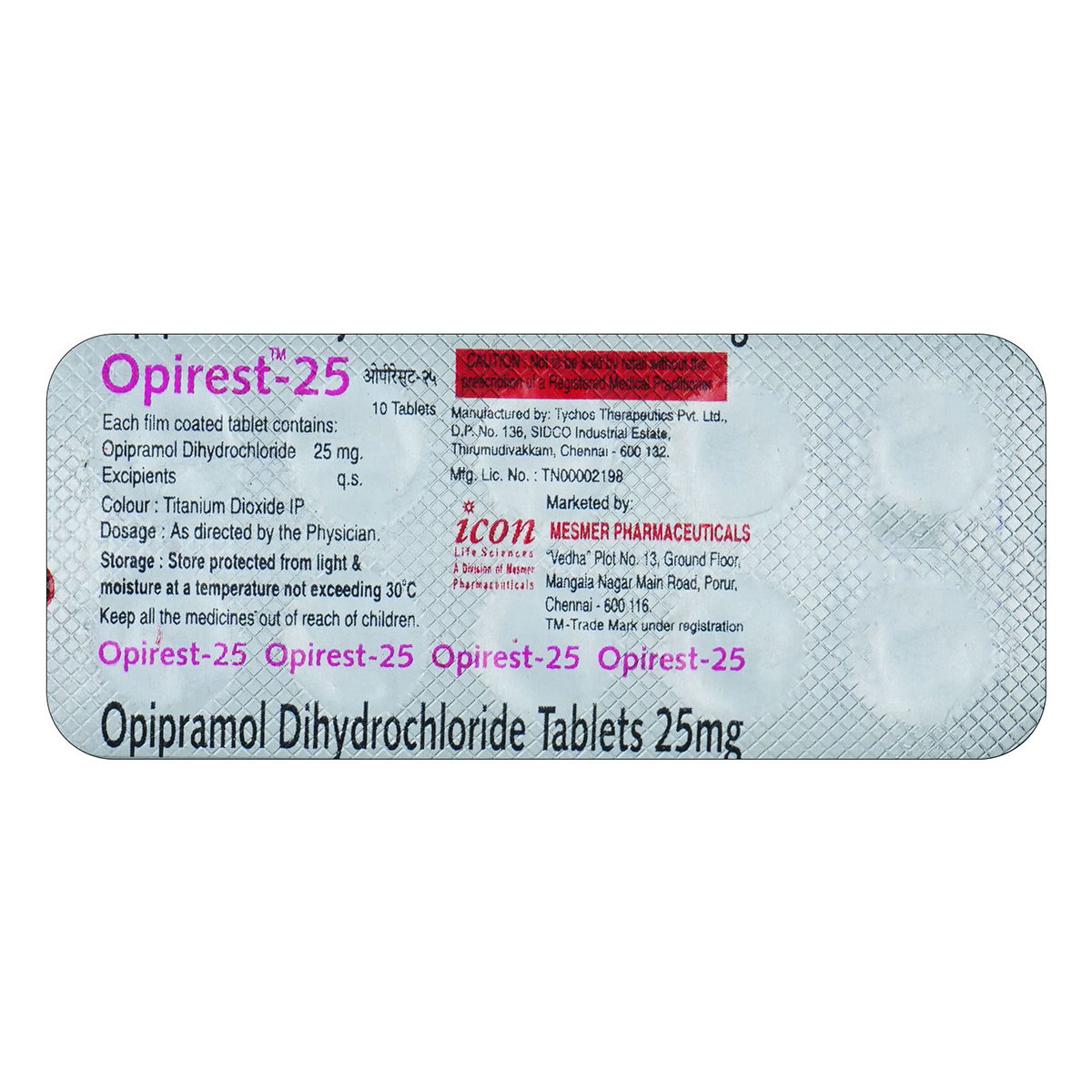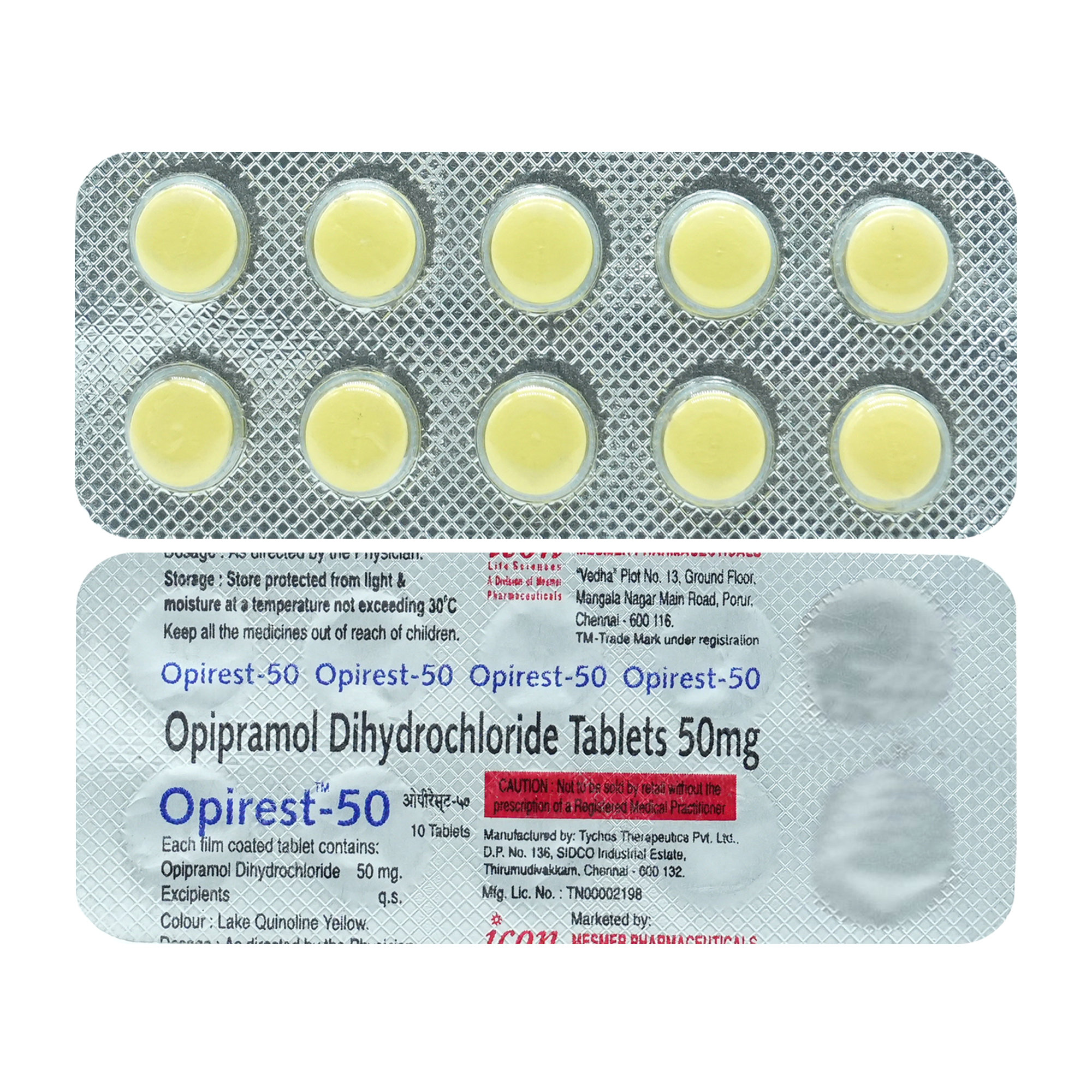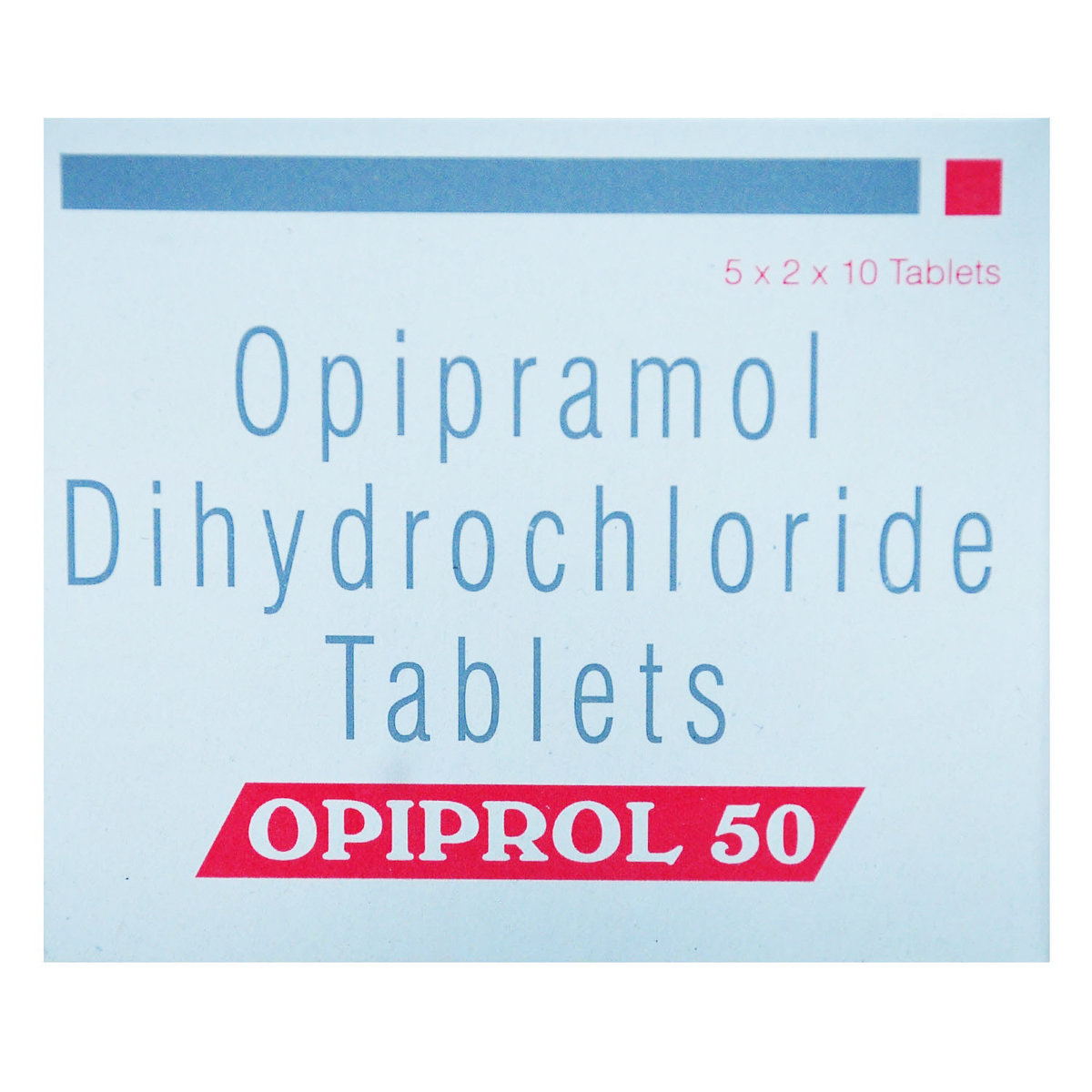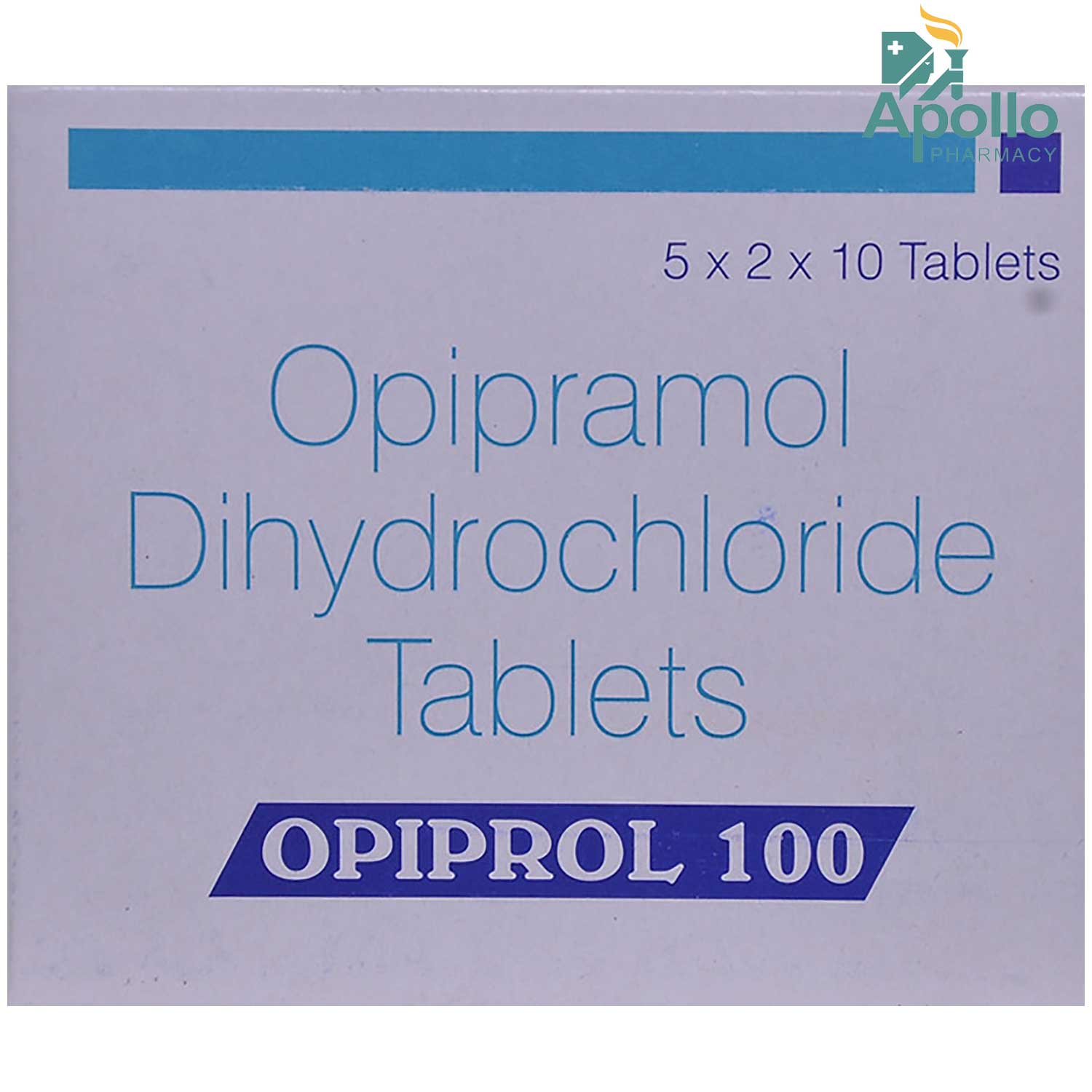Opipramol Dihydrochloride
About Opipramol Dihydrochloride
Opipramol Dihydrochloride contains an 'anti-anxiety medication,' primarily used to treat anxiety disorder. It is also used to treat somatic disturbances. An anxiety disorder is a mental problem characterized by feelings of excessive fear or worry that affects an individual's daily activities. Somatic disturbances is a disorder in which a person puts an extreme focus on physical symptoms like fatigue and pain, which causes major emotional stress and problems in functioning.
Opipramol Dihydrochloride contains Opipramol (a tricyclic anti-depressant), which is used to treat general anxiety. It works by increasing the levels of certain chemical messengers in the brain that help in regulating mood and behaviour. As a result, a person can perform daily activities with more productivity and also improve quality of life.
Take Opipramol Dihydrochloride as prescribed by your doctor. You are advised to take Opipramol Dihydrochloride for as long as your doctor has prescribed it for you, depending upon your medical condition. In some cases, you may experience nasal congestion (stuffy nose), dryness in the mouth, fatigue, hypotension (decreased blood pressure), orthostatic hypotension (sudden lowering of blood pressure on standing), drowsiness. Most of these side effects of Opipramol Dihydrochloride do not require medical attention and gradually resolve over time. However, if the side effects are persistent, reach out to your doctor.
If you are pregnant, planning to become pregnant, or breastfeeding, please inform your doctor Opipramol Dihydrochloride contains Etizolam, a habit-forming drug, so take it in dose and duration prescribed by a doctor. Do not stop taking Opipramol Dihydrochloride even if you feel better as it may lead to withdrawal symptoms. Opipramol Dihydrochloride is known to cause drowsiness, so do not drive or operate machinery. Avoid consumption of alcohol as it may reduce the effectiveness of Opipramol Dihydrochloride.
Uses of Opipramol Dihydrochloride
Medicinal Benefits
Opipramol Dihydrochloride contains an 'anti-anxiety medication,' Opipramol (a tricyclic anti-depressant), which is used to treat general anxiety. It is also used to treat somatic disturbances. It works by increasing the levels of certain chemical messengers in the brain that help in regulating mood and behaviour. Opipramol Dihydrochloride reduces anxiety symptoms like tiredness, restlessness, difficulty concentrating, feeling irritability, and insomnia (sleep problems). Hence, it will improve daily activities and increase productivity.
Directions for Use
- Take Opipramol Dihydrochloride with or without food or as advised by a doctor.
- Follow your doctor's instructions on the dosage and timing of this medication, to ensure the safety.
- Swallow the medicine as a whole with glass of water.
- Do not crush, break, or chew it.
Storage
Side Effects of Opipramol Dihydrochloride
- Nasal congestion (stuffy nose)
- Dryness in mouth
- Fatigue
- Drowsiness
- Hypotension (decreased blood pressure)
- Orthostatic hypotension (sudden lowering of blood pressure on standing)
Drug Warnings
Do not take Opipramol Dihydrochloride if you are allergic to Opipramol Dihydrochloride or any of its ingredients. Inform your doctor before taking Opipramol Dihydrochloride if you are pregnant or breastfeeding. Opipramol Dihydrochloride is known to cause drowsiness, so do not drive or operate any machinery that requires mental alertness if you are taking Opipramol Dihydrochloride. Avoid consuming alcohol while taking Opipramol Dihydrochloride, as it may cause excessive sleepiness or drowsiness. Your doctor may constantly monitor your blood counts and liver functions. If you have a fever, stomach pain, nausea, or observe yellowing of your eyes or skin, please inform your doctor. Also, do not suddenly stop taking Opipramol Dihydrochloride as it might lead to bradycardia (slow heart rate), cardiac problems. Monoamine oxidase inhibitors (anti-depression medication) should not be taken along with Opipramol Dihydrochloride as they are known to cause serious unpleasant side effects.
Drug Interactions
Drug-Drug Interaction: Opipramol Dihydrochloride is known to interact with monoamine oxidase inhibitors (selegiline, moclobemide), beta-blockers (propranolol, atenolol), anti-convulsants (diazepam, clonazepam).
Drug-Food Interaction: Opipramol Dihydrochloride is known to interact with alcohol as it might increase the drowsiness effect of Opipramol Dihydrochloride.
Drug-Disease Interaction: Opipramol Dihydrochloride is known to interact in patients with liver or kidney problems, urinary retention, bladder problems, glaucoma, BPH (benign prostatic hyperplasia), pyloric stenosis (food is unable to reach small intestine), history of seizures.
Drug-Drug Interactions Checker List:
Safety Advice

Alcohol
unsafeAvoid consumption of alcohol with Opipramol Dihydrochloride as it may increase the risk of drowsiness and other adverse effects.

Pregnancy
cautionOpipramol Dihydrochloride is a Category C pregnancy drug, and safety is unknown. Please consult your doctor if you are pregnant or planning for pregnancy.

Breast Feeding
cautionIt is unknown whether Opipramol Dihydrochloride is excreted in human milk. Please consult a doctor before using Opipramol Dihydrochloride while breastfeeding.

Driving
unsafeOpipramol Dihydrochloride may cause dizziness, double vision, or drowsiness in some people. Therefore, avoid driving if you feel drowsy, dizzy, or experience any vision problems after taking Opipramol Dihydrochloride.

Liver
cautionTake Opipramol Dihydrochloride with caution, especially if you have a history of Liver diseases/conditions. The dose may be adjusted by your doctor as required.

Kidney
cautionTake Opipramol Dihydrochloride with caution, especially if you have a history of Kidney diseases/conditions. The dose may be adjusted by your doctor as required.

Children
cautionThe safety of Opipramol Dihydrochloride in children is unknown. Please consult a doctor.
Habit Forming
Diet & Lifestyle Advise
- Do regular exercise and maintain healthy body weight.
- Maintain a diet rich in fruits, vegetables, and whole grains.
- Avoid fried foods, high-fat dairy products, pastries, and processed foods as they may worsen anxiety.
- Follow a regular sleep pattern. Do not take a nap during day time.
- Avoid watching tv, using mobiles or laptops just before bedtime.
- Avoid consumption of alcohol as it may increase drowsiness.
Special Advise
Opipramol Dihydrochloride causes drowsiness. Avoid doing activities that require your complete focus and attention, like driving when taking Opipramol Dihydrochloride.
An abrupt stoppage of Opipramol Dihydrochloride can lead to significant withdrawal symptoms. Always discuss with your doctor about decreasing the dosage before completely stopping its usage.
Avoid consuming alcohol while on Opipramol Dihydrochloride as it can lead to dangerous side effects.
Constant monitoring of blood pressure and liver function is required when taking Opipramol Dihydrochloride
Patients Concern
Disease/Condition Glossary
Anxiety: High levels of anxiety can cause panic attacks, with intense feelings of nervousness, fear, and sudden onset of sweating, hyperventilation, fast heartbeat, and flushing of the skin. Anxiety disorders are different from feelings of anxiety and feeling nervous that involve excessive anxiety, fear, or worry. Fear can arise due to anxiety and emotional response to an immediate threat related to more staying to fight or leaving to escape danger. Fear before getting ready for the surgery is also a part of short term anxiety. Anxiety disorders can affect an individual’s job performance, school work, and personal relationships.
Somatic disorder: It is a disorder in which a person puts an extreme focus on physical symptoms like fatigue, pain, which causes major emotional stress and problems in functioning. It is generally lead to often thinking of the worst outcomes. Treatment helps to cope with these symptoms and improve quality of life.
FAQs
Opipramol Dihydrochloride is used to treat anxiety disorder and somatic disturbances.
Opipramol Dihydrochloride contains an 'anti-anxiety medication,' Opipramol (a tricyclic anti-depressant), which is used to treat general anxiety. It works by increasing the levels of certain chemical messengers in the brain that help in regulating mood and behaviour.Â
No, you are not recommended to stop taking Opipramol Dihydrochloride without consulting your doctor as it may cause withdrawal symptoms such as bradycardia (slow heart rate) or other cardiac problems. Therefore, take Opipramol Dihydrochloride for as long as your doctor has prescribed it, and if you experience any difficulty while taking Opipramol Dihydrochloride, please consult your doctor so that the dose may be gradually reduced.
Yes, you need to monitor your liver functions regularly. And also, as Opipramol Dihydrochloride is known to cause hypotension (low blood pressure), please monitor your blood pressure regularly.
Elderly patients (aged more than 65 years) are more likely to have confusion and sleepiness, or age-related health issues, which may require caution and an adjustment in the dose for patients receiving Opipramol Dihydrochloride. So, it is better to consult a doctor before taking this medicine.
Anxiety is a feeling of fear, worry, or uneasiness. Symptoms include irritability, lack of concentration, fatigue, trembling, and rapid heartbeat. If you experience repeated episodes of anxiety, consult a doctor immediately.
Opipramol Dihydrochloride may cause drowsiness. So, do not drive or operate heavy machinery while taking Opipramol Dihydrochloride. Also, do not consume alcohol as it might increase the sleepiness effect of Opipramol Dihydrochloride.






